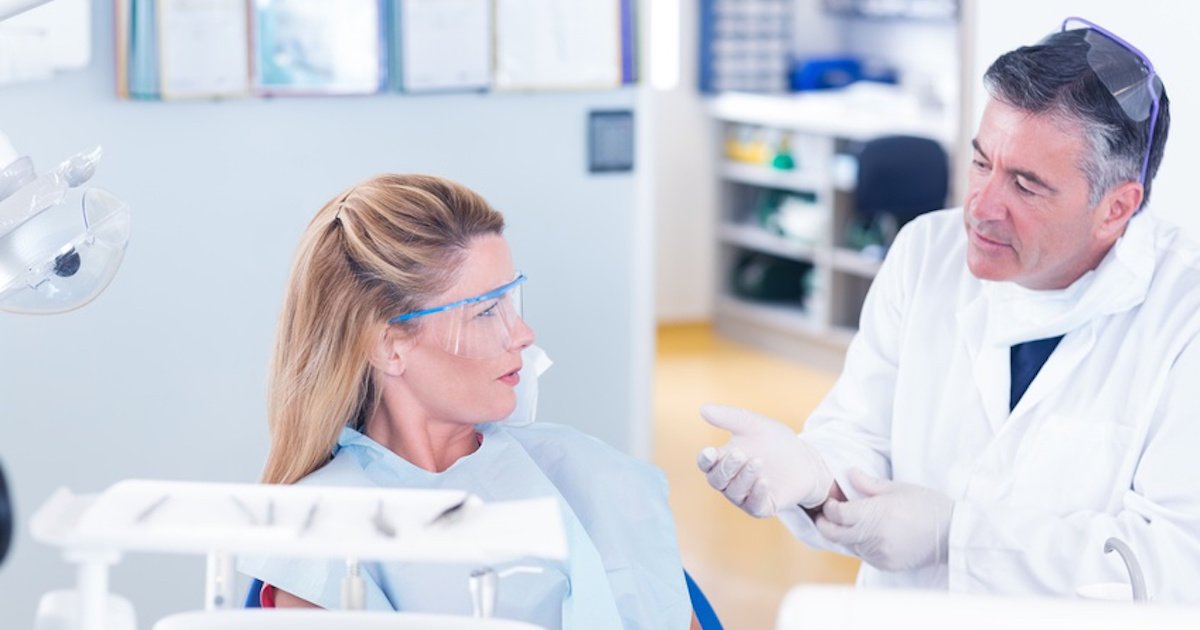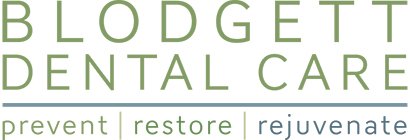Can Braces Cause Gum Recession?

400,000 people in the U.S. develop gum recession from braces every year. That’s 10 percent of all orthodontic patients.
As if braces weren’t uncomfortable (and expensive) enough already, many people who have worn them are now stuck choosing between two alternatives: living with painful, sensitive teeth, or getting painful gum surgery to fix the problem.
The truth is, those aren’t your only options. In this post, I’ll go through a less painful, minimally-invasive treatment for gum recession. And, if you’re currently debating whether you should get braces, I’ll give you my take on that, too.
Let’s dive in.
What Is Gum Recession?
 Gum recession happens when the gum tissue right around your teeth wears away or gets pushed back. This process exposes the top part of your teeth, the root, which is normally covered and protected by your gums. As the roots of your teeth become exposed, many people say their teeth are more sensitive to hot, cold, spicy, sweet or acidic foods.
Gum recession happens when the gum tissue right around your teeth wears away or gets pushed back. This process exposes the top part of your teeth, the root, which is normally covered and protected by your gums. As the roots of your teeth become exposed, many people say their teeth are more sensitive to hot, cold, spicy, sweet or acidic foods.
So how do you know if you’re dealing with gum recession? One of the first and most common signs is tooth sensitivity. Visually, your teeth may also look longer than before and you may notice a darker appearance to the teeth along the gumline.
Gum recession is actually very common. It can happen so gradually, that many people have mild gum recession and don’t even know it. Severe cases, though, can be dangerous for your oral health and put you at serious risk for tooth loss in the future.
What Causes Gums to Recede?
Gum recession can be caused by a wide variety of things, including the following:
Periodontal diseases (a.k.a gum diseases). These bacterial gum infections are one of the most common causes of gum recession. Gum disease needs to be treated as soon as possible.
Insufficient dental care. Not brushing, flossing, and getting regular professional cleanings makes it easy for plaque to build up on your teeth. That can also lead to gum recession.
 Brushing too hard. Scrubbing too aggressively when you brush, is bad for your gums. That’s why I always recommend gentle brushing with a soft toothbrush.
Brushing too hard. Scrubbing too aggressively when you brush, is bad for your gums. That’s why I always recommend gentle brushing with a soft toothbrush.
Genetics. Unfortunately, some people are simply more susceptible to gum disease, which means they’re also more susceptible to recession.
Grinding teeth. Some people grind or clench their teeth while they sleep due to stress, a misaligned bite, jaw conditions, or other factors.
Braces. Unfortunately, people who have had braces are much more likely to have receding gums than people who haven’t.
How Do Braces Cause Gum Recession?
There’s a reason braces make your mouth sore. Braces pull your teeth out of their natural position and into a new one. That’s a lot of pulling on your teeth.
Those constant compressive forces that are applied to the bone of your mouth during braces can lead to inflammation, which may cause the bone to go away. For many people, if they lose bone around teeth, the gums will follow the bone which creates (you guessed it) gum recession.
Treating Gum Recession
Gum recession is not something you want to ignore. Receding gums often leave little spaces, or pockets, where they meet the teeth. Bacteria love these little pockets, which is why receding gums may eventually lead to gum disease.
If you have gum recession from braces or anything else, you don’t have to resign yourself to living with it. You have options.
Up until recently, the only treatment was a painful tissue-grafting surgery, involving scalpels and stitches.
Luckily, invasive oral surgery isn’t the only solution anymore. More and more dentists in the U.S. are offering an incision-free, suture-free procedure called Pinhole Gum Rejuvenation. It’s as effective as traditional treatments and significantly much less painful with a much easier recovery.
I’ve seen this procedure do wonders for many of my patients. In fact, I was the first dentist in the entire Pacific Northwest to be trained in Pinhole Gum Rejuvenation.
Here’s how it works:
The best part is, recovery time is almost non-existent — most of my patients only need Advil for about a day afterward.
Does This Mean I Shouldn’t Get Braces?
People often ask me if the risk of gum recession is serious enough that they should simply avoid getting braces in the first place.
I can’t give a good answer to that question without doing a dental examination and knowing a little bit about your history. Everyone is different, but I do frequently recommend that patients not get braces. If there is a history of gum disease and/or gum recession in their family, braces may make these conditions worse.
There’s no denying that sometimes teeth need to be moved — very crooked teeth can be hard to clean and, in rare cases, can make it hard to chew properly. Orthodontists have been using braces to straighten teeth for decades. However, today there are other more conservative options to consider.
The DNA appliance: an Alternative to Braces
If you haven’t fixed your crooked teeth because you don’t want to risk gum recession, the DNA appliance may be a perfect solution for you.
In this case, DNA stands for Daytime-Nighttime Appliance. It was originally invented as a sleep apnea treatment, because it encourages your airway to open up, making it easier to breathe at night.
The DNA improves the alignment of your teeth too. It works by applying light intermittent vibrational forces to your teeth while you’re wearing it.
We now know that these vibrational forces are much more likely to stimulate bone development compared to the compression on the bone from traditional braces. The DNA appliance we offer in our practice is designed to both straighten teeth and improve the function of the upper airway. How about that for a better option for your health?!!
Questions?
Suffering from gum recession is not fun, but neither is living with crooked teeth. If you have questions about Pinhole Gum Rejuvenation, the DNA appliance, or other treatment options, please don’t hesitate to get in touch. Call us today to make your appointment!
Read Also
Mouthwash Is Bad For You: 4 Better Alternatives
Mouthwash Is Bad For You: 4 Better Alternatives [Updated 5/25/2024]Did you know that Listerine was once marketed as a surgical antiseptic and powerful floor cleaner? What you don’t know about mouthwash might surprise you. Especially when it comes to your dental...
Blodgett Dental Care Embodies Humanistic Dentistry
Blodgett Dental Care Embodies Humanistic Dentistry Dentistry has become “green washed” with terms that are now meaningless. Practically every dental practice is using terms such as “holistic”, “biological”, “functional”, and “integrative” to capture clicks with their...
Toxic Tuesday: Wisdom Tooth Extractions and Breast Cancer
The Connection Between Wisdom Tooth Extractions and Breast Cancer Wisdom teeth are extracted in the United States at a rate of more than 10 million every year! But what are the consequences to your health when the extraction sites do not heal properly? Today’s story...





